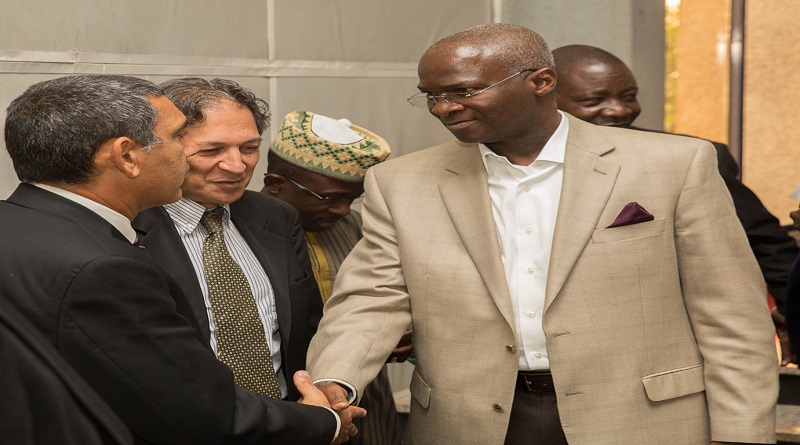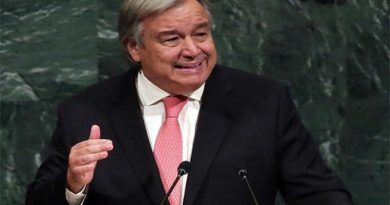Fashola: Time was now ripe to take forward solar power
The Minister of Power, Works and Housing, Mr. Babatunde Fashola SAN, Thursday met with sponsors, investors and promoters of Solar Energy in the country saying the time was now ripe to take forward the solar power projects in the country and begin to deploy it as an integral part of the Energy Mix in the Federal Government’s efforts to achieve incremental power.
Fashola, who spoke to journalists after the meeting which took place at the Transmission Company of Nigeria (TCN) Auditorium in Maitama, Abuja, said the country needs all the energy it could possibly source in order to attain the goal of incremental, steady and ultimately uninterrupted power.
The Minister, who said the meeting was convened to, among other reasons, discuss how to bridge gap between the cost of solar and other sources of energy available with the sponsors of the solar initiatives, assured that as soon as this is concluded government would quickly then sign their commercial agreements and power purchase agreements so that they could go to their financiers and banks to draw down and start the projects across the country.
Noting that the solar energy is more expensive than other types of energy, Fashola, however, said the advantage it has over other energy types was that the price seldom goes up. “It stays fixed or comes downâ€, he said, adding that the purpose of the meeting was to see how we can bring the cost to market price and “at its most competitive price and hopefully make it affordable to peopleâ€.
“Solar is one of the options for incremental power. You know I have been talking about the roadmap to power from incremental to steady to uninterrupted power. So we are walking our talk. We are looking everywhere where we can get energyâ€, the Minister said adding the reason the country has not had solar till now was that it also comes at a cost.
He explained further, “At the market price today in Nigeria, and I qualify “in Nigeriaâ€, it is a little more expensive than even gas power and the issue now is how we can bring down the price; because if we don’t bring down the price, it means that government will continue to subsidize this with the propensities that subsidies carry with themâ€.
“But the market price at entry is 17 cents per kilowatt/hr which if you multiply with 200 will get you N34 which is more expensive than the current gas and other typesâ€, he said adding, however, that the plan to get the production at a satisfactory price and fast-track the takeoff of the projects was consistent with government’s plan for an Energy Mix.
Reiterating that the problem remained essentially the price “and the liquidity issue that are in it going forwardâ€, Fashola said the implication of government taking on the initiative without resolving the cost being presented by the sponsors and promoters, was that government would be paying about N3 billion to subsidize power adding, “We can’t carry that kind of subsidyâ€.
“So we are trying to see how we can bring that down; that is why we are having this meeting. And they have shown a lot of enthusiasm, they are looking at how they can reduce some of those prices, trying to see if there are off takers who would take it at those prices, those who want premium power because they can see that even at that prices it is cheaper than their generatorsâ€, he said.
Listing some of the options presented by the sponsors, Fashola disclosed that they are suggesting to government to intervene by taking off VAT and import duty charges and give them waivers on components they import to build the solar and also asking for possible access to some Central Bank finance loans that would reduce the cost of money.
“At the end of the day, all of these variables, cost of imports, cost of panels, interest rates, tenure of the loans and how long it takes to close these transactions ultimately affect the price at which the energy comes to you and I at homeâ€, the Minister said adding that his intention was also “to meet with the people who are championing these developments instead of just looking at the papersâ€.
According to the Minister, the takeoff of the solar projects would also create employments and stimulate the local economy. “It also means green jobs, renewable energy jobs, a new economy for Nigeria if we kick-start all of these initiativesâ€, he said.

Fashola said because the projects are scattered across the country, “their pricing models are different, their efficiency levels in terms of availability of sun is differentâ€, noting that some are in the South, some are in the North where there is much more reliable sunlight. In such situation, he said, everybody could not be fixed into the same price.
The Minister said government has given the promoters three broad options along which to work including that those who could find their dedicated off takers should do so while those who could reduce their price should also do so and those who insist on certain other conditions were free to come forward with the proposals. He added, “Ultimately, the point is that the burden to government in terms of massive sourcing of about N3 billion or more in a month is not passed to usâ€.
On what was the decision of government concerning solar as the alternative energy source given the cost, Fashola declared, “The matter is not foreclosed yet. We want to get as much as we can. We are starting a journey and we have not established the end lineâ€.
“We are lucky as a country that we have so much sources to get energy- we have gas, we have coal, we have biomass, we have water and we have the sun. Some countries don’t have all of what we have; so we want to optimize all of them efficiently in a way that we reduce the cost to which energy gets to the people.
“So that is the juice of the Energy Mix that I have been talking about. We have done a lot of gas, we have done some hydro, so let us start some of the solar and begin to deploy it. We will move to do some coal as well while trying to stay within the parameters of environmental compliance. We need energy and every energy now I will takeâ€, the Minister said.
A Communiqué read at the end of the meeting by the Permanent Secretary, Power, disclosed that the promoters agreed to meet over the next few days to refine, update and reduce, where possible, the price at which they are going to bring solar unto the National Grid.
According to the Communiqué, the promoters, in considering the reduction of price, would also make “specific suggestions of things government can do with regards to VAT, access to credit and whatever that will help them bring that cost down as far as possibleâ€.
“The meeting also agreed that there is a third track that NBET, over the next week, will define the magnitude and process for a competitive procurement that will include those sponsors that are willing to go through those tracks and that process will include a commitment from NERC to embed whatever quantum of solar power comes out of the competitive procurement into the tariff so that NBET is not exposed to any subsidyâ€â€, the Communiqué said.
The Communiqué also disclosed that some of the solar promoters and sponsors expressed their readiness “to engage with the Discos, State Governments and other off takers who will be ready to take energy at the cost the solar generators are willing to sell it thereby without compromising the guarantee NBET provides, thereby insulating EMBET and government from the gap in tariffâ€, adding that the Ministry and NBET would give assistance to those who were willing to do so.
Noting that Government was mindful of the price at which the new generation from solar could come into the Grid and the sponsors’ appreciation of government’s concern, the Communiqué, however, said some of the Solar sponsors expressed some frustration that “over the last four years, they have diligently progressed projects but the key elements that will make the projects happen, i.e. the Power Purchase Agreements, has not happenedâ€, adding that the meeting was called to deliberate on ways to make those PPAs happen “for as many of the projects as possibleâ€.
Also on Thursday, while addressing a meeting with critical contractors of the Transmission Company of Nigeria (TCN), Fashola again declared that Nigeria’s problem with electricity was not a difficult one at all pointing out that what has happened was that all the citizens have not come together to say this is a problem “in terms of thoughts and actions on how to solve the problemâ€.
He told the contractors, “I think these meeting will help us to form alliances that will go beyond just contractors and government to an involvement between the citizens of Nigeria and government and contractors working together to surmount one common problemâ€.
“And the more I see as I go across Africa, I think that in the next few years, we will be the litmus on how to develop power on this continent because what I am seeing shows that our opportunities are bigger than mostâ€, the Minister said.
Fashola, who said the meeting was to hear the big issues that confront the contractors so that they could be solved, told the contractors, “The objective is to quickly get you back to site where you will not only deliver the projects but to ensure that those workers that you laid off return to work so that we can begin to rebuild this economy page by page, block by block and section by sectionâ€.




